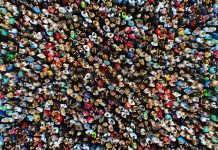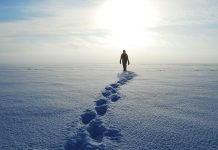Before I started looking for the meaning of life, I thought I had already found it. Or, that it had been given to me. In the world I came from, the road was clearly laid out. My life’s major events were all mapped out, and precious little was negotiable.
In fact, the people around me did not ask too many questions about “the meaning of life”, because they had something much more serious and concrete at hand, namely the purpose of life. I still didn’t know how big the world is and how many different forms of destiny fit into it, but I already suspected that, although having a purpose is good in itself, normality still cannot be judged statistically.
Later, when I began to wonder—not yet about the meaning of life, but something similar—I discovered books, and the fact that the world is infinitely complex, beyond the comprehension of any of us. It was not a small thing for an ordinary child to know that every important question had a very concrete answer.
Thus I learned, I am happy to say, that I do not have any ultimate sense of truth, that the world (and God Himself) is infinitely greater than my power of understanding, and that every man sees only a small fragment of the world.
If we could gather all these fragments together, we could see an image of the world and of God that resembles us all, and that includes us all in the same way.
It was also when I began to wonder, and also through books, that I found out something else. When I went to the library, I liked to linger among books for indefinite periods of time. Before they got used to my timid and eternal presence, the ladies who worked there asked me if I needed help. I didn’t. I was in my happy place. I had not yet discovered the meaning of life, but I had discovered something quite valuable: that it is important to find a place where you feel at home, that you do not want to leave, and where you are whole without wanting to be anywhere else. I also learned that it is better to learn than to think you know, just as it is better to search than to find. In the footsteps of Jorge Luis Borges, I discovered that the journey is more important than the conclusion, because the road itself is the meaning.
A little later I discovered—in the footsteps of The Protestant Ethic, which seriously contributed to the construction of capitalism—the value of labour. Not as fulfilment, not as life’s meaning, and not as a substitute for family life, but out of the simple need to do my job as well as I could, wherever I was and for however long I was there. I still believe in what Kotarbiński calls “a job well done.” That’s how I found out that my life had only one perspective: to be a traditional and probably rural life, thousands of possibilities suddenly opening up, some of them resembling success. I say “resembling” because, as we already know, overwork does not solve many of the problems we expect it to, not even the famous problem of “tomorrow”: the future always stubbornly looks different than we presuppose.
Like most other illusions (money, success, power, luxury—insert whatever you wish here), one’s career also fails to be meaningful in itself, or even a path to meaning (although it can really help to support one’s plans, at least the financial aspects). And, no, life between two flights is not pleasant, no matter how appetising it may be when displayed in commercials or movies. Neither are the exhausting meetings in beautiful places that you do not have time to enjoy, nor the accommodation in beautiful hotels where you do not have time to rest.
The ways in which you earn your living should not become the means by which you lose it, and working for a living means, among other things, not working yourself to death. By the way, I was lucky enough to stop running when the whole planet stopped, unexpectedly.
In 2020, when faced with a future that no longer resembled anything familiar, we all stopped and realised that it is possible to do things differently. And, just like Socrates, walking through the agora of Athens, rejoiced to see how many things there were that he did not need, we also discovered, unwittingly, how many things we can lack without missing them. At the same time, because we stopped and rested, we had time to consider where we were actually going.
The problem of “where” remains the most acute in all of our existence: What is our meaning and what is the meaning of everything? Especially in key moments—of suffering, of pandemic, of instability—or simply in the moments when man remembers that he has, as a man, a death sentence in his pocket, the issue of “where” acquires tragic proportions.[1] If life makes sense, what is it? If it doesn’t, can we find one? Or, if it makes sense, shouldn’t it be beyond the brink of death? People have always sought to ensure their posterity in different ways: through descendants, through works of art or philanthropy, through wars, through different philosophies, through material and non-material acts. Similarly they have sought, through traditional or alternative medicine, various ways to prolong life indefinitely. The most persistent dream of mankind remains Immortality, precisely because the main problem of humanity is Death. And the main absurdity. How can we understand this enigmatic existence, in which nothing is clear except its futility?[2] How can we bear, if not the lack of meaning, at least our inability to understand meaning in rational terms? Or how do we figure out how to believe in meaning not only when good things happen (which is quite easy), but also when times get rough?
I have no answer to the questions above, but I thought of using a process that I use frequently in my work when I encounter a problem: to go to the source of the problem. In this case, the origin of mankind. According to the biblical report, when man was created, he also received several commandments, among which: to grow, to multiply, to rule over the creation and to get to know it by giving each animal a name.
So he received the urge to live, because the meaning of life, from the beginning, was life itself.
And at the same time, in the same context, God forbade man to eat from the Tree of the Knowledge of Good and Evil, not to stop us from knowing Good, but to stop us from knowing Evil. In God, we already knew the supreme Good. Evil turned out to be death itself, the absurdity that the human brain is not genetically programmed to understand, because it represents the denial of life, the denial of reason and meaning, the denial of God and the denial of man. In fact, when he advises man not to know Evil, God proposes that he not know death and meaninglessness. And later, after he comes to know Evil, God proposes—in the same context of free choice—a strategy of restoration and a recovery of meaning. A new beginning. The lost paradise thus becomes, for mankind, a Paradise that can be found. And the meaning of life becomes, as it was in the beginning, life itself. Life without death.



















